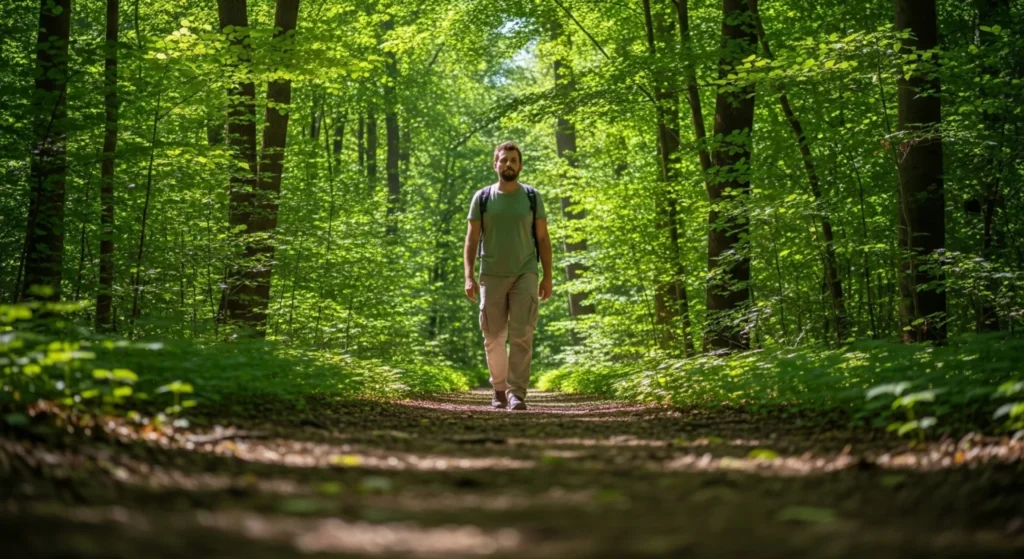6 Powerful Ways Nature Walks Support Mental Wellness

Introduction:
6 Amazing Ways Nature Walks Support Mental Wellness
Overview: Why Nature Walks are Important
There’s no denying that living in a fast-paced world deemed digital leads to anxiety and feeling overwhelmed at times. The long hours inside, the consistent time spent in front of a screen, and a decrease in quality exposure to fresh air take their toll on mental wellness. Luckily, there is a free, accessible natural remedy that research has shown to improve mood, lower stress, and increase concentration – nature walks!
Generally, nature does wonders for mental health in a short amount of time, even if it is for 20 minutes a day! A study from 2019 showed that spending 20 to 30 minutes in nature reduces levels of cortisol (the stress hormone) more than most urban stress-reduction practices, even just ‘fresh air’ (Hunter et al., 2019). Walking outside, surrounded by the outdoors, which helps reconnect us to the rhythm of life, gives our minds room to breathe!
In this article, I’ll share with you six researched and practical ways nature walks can support your mental wellness, along with some goodies to support this!
Nature Walks Calm the Mind and Relieve Stress
The most direct and well-documented benefits of walking in nature are stress relief. Natural settings are usually quiet, peaceful, and filled with restorative visual and auditory stimuli like gentle winds rustling leaves or the songs of birds.
When you are in a forest or walking by a body of water, your blood pressure and heart rate drop, the depth and frequency of your breathing slow, and your parasympathetic nervous system is activated for relaxation.
How to Practice:
- Walk slowly and mindfully with your attention focused on your breath.
- Do not check your phone unless to play soothing music or take calming pictures of nature.
- Consider trying forest bathing, also called “shinrin-yoku” in Japan, which is immersing yourself in the forest with all 5 senses.

Elevates Mood and Decreases Symptoms of Depression
Exposure to green spaces is strongly associated with elevated mood and decreases in depressive symptoms. Walking in nature can stimulate the production of endorphins and serotonin (the mood and happiness neurotransmitters).
A 2020 Scientific Reports study found significant improvements in health and well-being for people who spend 2 hours a week in nature compared to those who don’t. Interestingly, when they did nature walks regularly, the effects were even more considerable.
Actionable Tip:
- Walking in a natural park or garden at least 3-4 times a week.
- Take a journal and write down what you see, hear, and feel during the walk.
- As you pass others, smile and greet them; positive social interaction improves mood as well.
Feeling tired and low on energy? Support your body’s level of natural energy production with Advanced Mitochondrial Support, a doctor-recommended formula.
Improves Focus and Mental Clarity
Nature walks have proven extremely helpful for people who have difficulty with sustained concentration, attention, or mental fatigue. Natural settings help the mind achieve a state called “soft fascination,” which is a gentle pattern of attention to help restore energy and improve cognitive function.
Studies have shown significant improvements in attention in children and adults with ADHD after spending only 20 minutes in a green outdoor setting. This is more effective than walking in urban settings or indoors.
How to Make This Work:
- Go for a short walk in nature before a mentally demanding task, somewhere between 15-30 minutes.
- Use these walks to clear your mind and allow you to prioritize your to-do list without realizing it.
- Consider doing walking meetings or phone calls to combine productivity and healthy habits.
Improves Sleep and Restorative Rest
Natural light exposure helps regulate your circadian rhythm – the internal clock that regulates the cycles for sleeping and waking. When your body receives natural sunlight during a walk in nature, especially in the morning, it will be much easier to fall asleep and wake up feeling refreshed.
Breathing fresh air and light movement also relieve anxiety, making it that much easier to let go of what is causing you stress before you drift off to sleep.
Strategies for positively impacting sleep with nature walks:
- Walk when the sun is going down at the end of the day. Use the walk to begin winding down.
- If you take a walk to clear your mind or feel calmer, when you return, accompany that with calming sounds – a nature sound playlist or white noise.
- Avoid bright screens for one hour following your walk to encourage relaxation.

Ties You to Mindfulness and Gratitude
Being in nature encourages mindfulness—the practice of being present in the moment. Everyone is familiar with the nature walk experience, where it pushes all your senses to become aware of the feel of the breeze, the smell of flowers, the sound of birds, and the feel of stones under your feet.
Mindfulness has such impacts on a person, such as:
- Lowered anxiety
- Improved emotional regulation
- Improved immunity
How to Mindfully Walk:
- Walk slowly and in silence for at least 10 minutes.
- Stop every few minutes and take a moment to observe your surroundings.
- Name five things you can see, four things you can hear, three things you can feel, two things you can smell, one thing you can taste (if it’s appropriate).
Creates Physical Activity That Depicts Gentle and Joy.
While other forms of exercise may demand a lot of intensity, walking in nature can be a practice that nearly everyone can participate in regardless of fitness level, as there are so many different types of ways to walk, which heighten and encourage regular movement without pressure or competition, which fosters motivation and longer-term wellness.
Light aerobic exercise, such as walking, can increase circulation, metabolism, and benefits for overall vitality. All of that without the punishment and soreness you feel afterward in the gym.
Ways to add it into your day:
- Make it part of your morning or bedtime routine.
- Find different nature spots every week for variety.
- Bring a friend or family member with you, building in social benefits.
External Resource: Learn more from the American Psychological Association on Nature and Mental Health
FAQs
How long of a nature walk will improve mental wellness?
Research shows that even 20 – 30 minutes of nature walking, three to four times a week, can help reduce stress and improve mood (Hunter et al., 2019).
Can nature walking substitute medications for anxiety or stress?
Nature walking can be a complementary activity and improve mental wellness, but should not be seen as a substitute for medication or treatment unless directed by a healthcare provider.
If I do not live near a forest or country, will urban parks work?
Yes! Even small urban green spaces, such as community gardens or riverside walking paths, will provide the majority of the mental health benefits of larger wilderness areas.

Conclusion:
Among the myriad costly options for stress relief and mental fatigue, nature walks remain one of the best options for improving mental wellness. Informed by science and adopted by numerous cultures, nature walks provide hip, calm, clarity, and bliss without a prescription.
Whether you feel mentally fatigued, stressed, or looking for more peace in your day, consider a nature walk as your therapeutic first step. Just take it one step at a time – you may just find you’re healing with every breath of fresh air.
You can support Your Energy Naturally: Increase your stamina and mental clarity with Advanced Mitochondrial Support.
Like calming down for your evenings? Check out our article on 5 Benefits of Relaxation Sounds: Rain, Focus & Sleep






